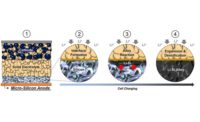EAST LANSING, MI—Michigan State University has created the MSU Mobility Advisory Council to gain insight on current and future trends, including research projects that the school may participate in.
“This council will have a big role in helping us identify new projects, as well as prioritize our mobility-related research and academic offerings, which is a core focus at Michigan State University,” says Satish Udpa, a professor of electrical and computer engineering who serves as interim director of MSU Mobility. “We are grateful to all council members who have committed to dedicating time to this group. [It] will be a truly valuable asset and we look forward to the in-depth, thought-provoking conversations and insight that will be shared.”
In addition to Udpa, council members include Dan Garrison and Clint Crook of Accenture; Paul Thomas of Robert Bosch LLC; Bethany Tabor and Jeff Myrom of CMS Energy; Robert Hubbard of Cisco; Bill Frykman of Ford Motor Co.; David Gorsich and Denise Rizzo of the U.S. Army Ground Vehicle Systems Center; Glenn Stevens Jr. of the Detroit Regional Chamber; and Frank Weith of Volkswagen Group of America.
“Currently, MSU is conducting a wide scope of significant research projects to help further position Michigan as a mobility hub, with a concentration on first- and last-mile initiatives and technologies,” explains Udpa. “More than 50 faculty members from seven colleges…are working collaboratively to advance MSU Mobility initiatives and will be active with and benefit from dialog of the new council.
“Ultimately, the council will help MSU Mobility leaders determine which research projects should be expedited, opportunities to refocus existing projects and new programs the university could undertake to best prepare…for the future of mobility,” adds Udpa.
Michigan State has already transformed its 5,200-acre campus into a live, connected ecosystem to advance smart-vehicle technology and better understand the human element. With a range of urban, suburban, industrial and rural zones, featuring nearly 60 lane miles of roads, MSU’s controlled infrastructure and active campus make it ideal to test emerging technologies for new mobility solutions.
Spartan Mobility Village is home to MSU’s mobility labs where roadways and parking lots can be closed to test new technologies. In the future, unoccupied buildings will be used as a background for sensing technologies, including radar clutter simulating the suburban and urban environment.
Michigan State has also just launched an exclusive partnership to provide e-scooters on campus with Spin, a San Francisco-based micromobility unit of Ford Motor Co. By this fall, hundreds of vehicles will be available to students and faculty.
The scooters will be available at various locations throughout campus. They have a top speed of 15 mph and are operational from 6 a.m. to 10 p.m. To unlock the vehicles, riders must download the Spin app onto their Apple or Android device. The scooters cost $1 to unlock and 20 cents per minute to ride.



